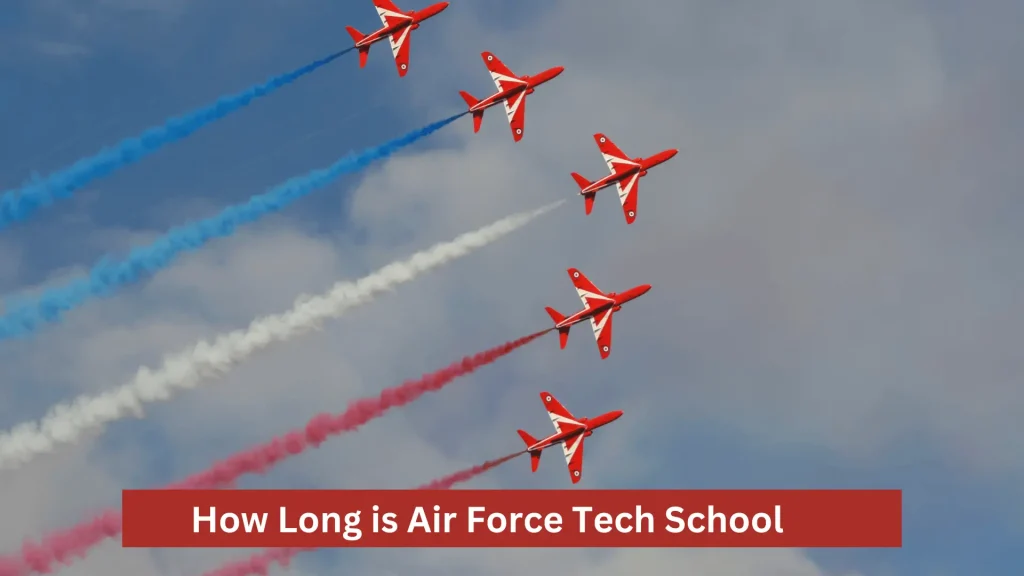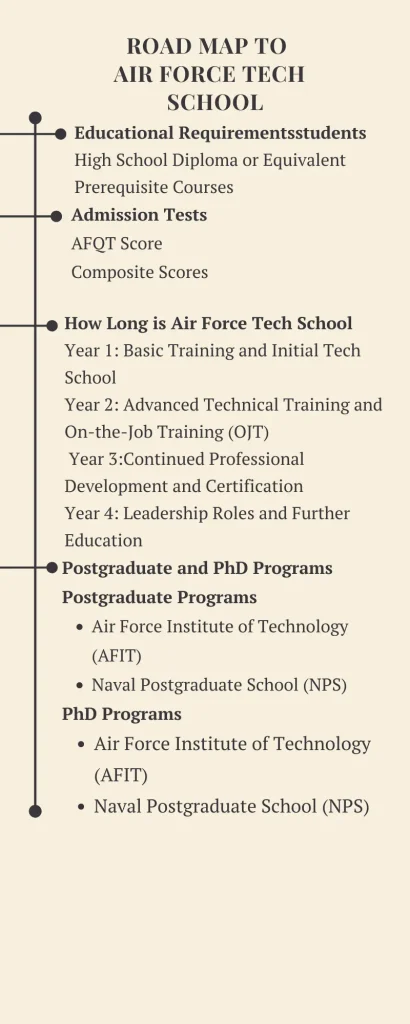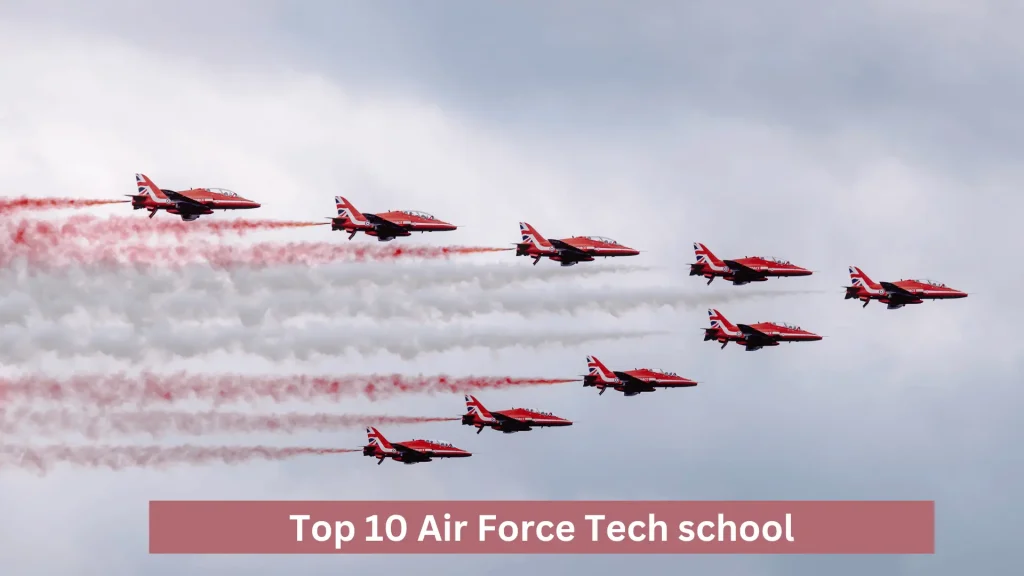How Long is Air Force Tech School
Air Force Tech School durations vary depending on the specialty. Generally, it can last anywhere from six weeks to over a year. The specific length depends on the technical requirements and complexity of the training program. Understanding “How Long is Air Force Tech School” helps in planning for your military career.
What is Air Force Tech School
Air Force Tech School is specialized training for new Airmen, focusing on their specific career fields. After basic training, Airmen attend Tech School to gain the technical skills required for their roles. These schools provide both classroom instruction and hands-on training, ensuring that Airmen are proficient in their designated specialties.

The curriculum at Air Force Tech School covers a wide range of technical and operational topics. Depending on the career field, this could include electronics, aircraft maintenance, medical training, or cyber operations. The goal is to ensure that Airmen are fully prepared to perform their duties effectively and support the mission of the Air Force.
How Long is Air Force Tech School
Year 1: Basic Training and Initial Tech School
Basic Military Training (BMT): The journey begins with Basic Military Training, an 8.5-week program at Lackland Air Force Base, Texas. This foundational training covers physical conditioning, military discipline, and basic combat skills.
Initial Tech School Training: After BMT, new Airmen proceed to their respective Tech Schools. The duration of this training varies by career field but typically ranges from six weeks to several months. During this time, Airmen receive specialized instruction and hands-on experience in their chosen technical specialties.
Year 2: Advanced Technical Training and On-the-Job Training (OJT)
Advanced Tech School: Some career fields require additional advanced training beyond the initial Tech School. This could involve more complex technical instruction and advanced operational techniques.
On-the-Job Training (OJT): Once Airmen complete their Tech School, they continue their training on the job at their assigned base. OJT involves practical, hands-on experience under the supervision of experienced personnel, ensuring that Airmen apply what they’ve learned in real-world scenarios.
Year 3: Continued Professional Development and Certification
Professional Military Education (PME): Airmen may begin participating in Professional Military Education programs designed to enhance their leadership and technical skills. These programs are essential for career advancement and personal development.
Certifications and Qualifications: Throughout their careers, Airmen have opportunities to earn additional certifications and qualifications related to their specialties. This ongoing professional development is crucial for maintaining proficiency and advancing in rank.
Year 4: Leadership Roles and Further Education
Leadership Training: As Airmen gain experience, they may be selected for leadership roles and responsibilities. This often includes attending leadership training courses and participating in mentoring programs.
Further Education: Many Airmen pursue further education, such as associate or bachelor’s degrees, often with support from the Air Force’s tuition assistance programs. Continuing education is encouraged to enhance career prospects and personal growth.

How to Enter Air Force Tech School
Educational Requirements for Air Force Tech School
High School Diploma or GED: Applicants must possess a high school diploma or an equivalent General Education Development (GED) certificate.
Specific Coursework: Some technical fields may require specific coursework in areas such as math, science, or electronics. These prerequisites vary by specialty.
Entry Tests for Air Force Tech School
Armed Services Vocational Aptitude Battery (ASVAB): All applicants must take the ASVAB, a multiple-choice test that measures aptitudes in various domains. The scores determine eligibility for specific Air Force career fields.
AFQT Score: The Armed Forces Qualification Test (AFQT) score, derived from the ASVAB, must meet the minimum requirement for Air Force enlistment.
Composite Scores: Certain career fields require specific composite scores on the ASVAB subtests, which are combined to match the technical demands of those fields.
Application Process for Air Force Tech School
Meet with a Recruiter: Prospective Airmen must first meet with an Air Force recruiter to discuss their eligibility, career goals, and the enlistment process.
Medical Examination: Applicants undergo a comprehensive medical examination at a Military Entrance Processing Station (MEPS) to ensure they meet the physical and medical standards.
Background Check: A thorough background check is conducted to verify the applicant’s moral and legal qualifications.
Job Selection: Based on ASVAB scores and available openings, applicants can select their preferred career fields. The final assignment will depend on the needs of the Air Force.
Enlistment Oath: Successful applicants take the Oath of Enlistment, committing to serve in the United States Air Force.
Financial Aids for Air Force Tech School
Tuition Assistance (TA): The Air Force offers TA programs that cover tuition costs for approved courses, helping Airmen pursue further education during their service.
Montgomery GI Bill (MGIB): The MGIB provides financial assistance for education and training, including college, technical courses, and certification programs.
Post-9/11 GI Bill: This bill offers extensive educational benefits, including full tuition coverage at public institutions, housing allowances, and stipends for books and supplies.
College Loan Repayment Program (CLRP): The CLRP helps repay student loans for eligible Airmen, reducing their financial burden.
Air Force Aid Society (AFAS): The AFAS provides grants, scholarships, and loans to Airmen and their families to support their educational pursuits.
Scholarships and Grants: Various scholarships and grants are available through military and civilian organizations, providing additional financial support for education.
Postgraduate and PhD Programs for Air Force Tech School
Postgraduate Programs:
Air Force Institute of Technology (AFIT)
Master’s Degrees: AFIT offers a variety of master’s programs in fields such as engineering, science, and management. These programs are designed to enhance the technical and leadership skills of Air Force personnel.
Professional Continuing Education: AFIT provides short courses and certificate programs for ongoing professional development in areas like cybersecurity, logistics, and systems engineering.
Naval Postgraduate School (NPS)
Joint Education: Some Air Force personnel may attend NPS, which offers a range of master’s degrees in defense-focused disciplines. This joint education fosters collaboration and a broader understanding of military operations.
Civilian Universities
Tuition Assistance: The Air Force offers tuition assistance programs for Airmen pursuing postgraduate degrees at accredited civilian universities. Fields of study often include business administration, public administration, and various STEM disciplines.
PhD Programs:
Air Force Institute of Technology (AFIT)
Doctoral Degrees: AFIT provides PhD programs in specialized technical fields, such as aeronautics, astronautics, electrical engineering, and applied physics. These programs aim to develop highly skilled experts capable of addressing complex challenges in the Air Force.
Naval Postgraduate School (NPS)
PhD Opportunities: NPS also offers PhD programs in areas pertinent to national defense and security. Air Force officers can apply to these programs to advance their expertise and contribute to interdisciplinary research efforts.
Civilian Universities
Sponsorship Programs: The Air Force sponsors highly qualified personnel to pursue PhD studies at top-tier civilian universities. These sponsorships typically cover tuition, fees, and a stipend for living expenses.
Technical and Strategic Fields: Sponsored PhD programs often focus on critical areas such as artificial intelligence, cybersecurity, aerospace engineering, and international relations.
Top 10 Air Force Tech Schools

1.Air Force Institute of Technology (AFIT)
Location: Wright-Patterson AFB, Ohio
Programs: Offers a range of technical degrees and professional continuing education in fields like engineering, logistics, and applied sciences.
2.Keesler Air Force Base
Location: Biloxi, Mississippi
Specialties: Known for training in cyber operations, electronics, and weather forecasting. Home to the 81st Training Wing.
3.Sheppard Air Force Base
Location: Wichita Falls, Texas
Specialties: Offers extensive training in aircraft maintenance, medical fields, and civil engineering. Houses the 82nd Training Wing.
4.Lackland Air Force Base
Location: San Antonio, Texas
Specialties: Provides training in security forces, intelligence, and linguistics. Known for hosting Basic Military Training (BMT).
5.Goodfellow Air Force Base
Location: San Angelo, Texas
Specialties: Focuses on training in intelligence, surveillance, and reconnaissance (ISR), as well as firefighting.
6.Vandenberg Space Force Base
Location: Lompoc, California
Specialties: Offers training in space operations, missile launch, and range operations. Key site for space-related education.
7.Eglin Air Force Base
Location: Valparaiso, Florida
Specialties: Known for advanced munitions training, explosive ordnance disposal (EOD), and environmental science.
8.Fort George G. Meade
Location: Maryland
Specialties: Provides advanced training in cyber warfare, information operations, and public affairs.
9.Joint Base San Antonio-Randolph
Location: San Antonio, Texas
Specialties: Offers training for pilots, navigators, and air traffic controllers. Known for the 12th Flying Training Wing.
10.Sheppard Air Force Base
Location: Wichita Falls, Texas
Specialties: A major hub for technical training in aerospace propulsion, aircraft systems, and avionics.
Factors Affecting the Length of Air Force Tech School
1. Career Field and Specialty
Technical Complexity: More technically complex fields, such as avionics or cyber operations, require longer training periods to cover advanced concepts and detailed procedures.
Specialization: Specific specializations within a career field may have additional training requirements, leading to longer durations.
2. Course Content and Curriculum
Course Requirements: The scope and depth of the curriculum, including both theoretical instruction and practical training, directly impact the duration. Programs with extensive hands-on components typically require more time.
Certification and Qualifications: Some career fields require Airmen to earn certifications or qualifications, which can extend the training period.
3. Training Location and Facilities
Base Infrastructure: The availability and quality of training facilities and equipment at different bases can influence the length of the training. Bases with state-of-the-art facilities may provide more efficient training.
Joint Training: Certain programs may involve joint training with other branches of the military, which can affect scheduling and duration.
4. Instructor Availability
Instructor-to-Student Ratio: A higher instructor-to-student ratio can lead to more personalized instruction and potentially shorter training times. Conversely, limited instructor availability can extend the training period.
Instructor Expertise: The experience and expertise of instructors can impact the efficiency of the training process.
Final Verdict
The length of Air Force Tech School varies based on multiple factors, including career field complexity, curriculum, and individual aptitude. Understanding these variables helps Airmen and their families prepare for the training duration, ensuring a smoother transition into their technical roles within the Air Force.
FAQs
1.How long does Air Force Tech School typically last?
The duration can range from six weeks to over a year, depending on the complexity of the career field.
2.What factors influence the length of Air Force Tech School?
Factors include career field, course content, training location, instructor availability, class size, student aptitude, policy changes, and technological advancements.
3.Is there any financial aid available for Air Force Tech School?
Yes, various financial aids like Tuition Assistance, the GI Bill, and scholarships are available to support Airmen’s education.
4.Do all Air Force Tech Schools offer postgraduate and PhD programs?
No, postgraduate and PhD programs are primarily offered by institutions like the Air Force Institute of Technology (AFIT) and the Naval Postgraduate School (NPS).
5.What are the entry requirements for Air Force Tech School?
Requirements include a high school diploma or GED, ASVAB test scores, a medical examination, a background check, and meeting with a recruiter.
